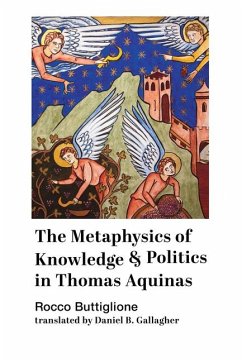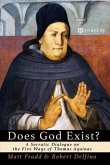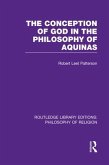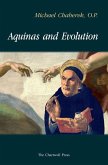Metafisica della Conoscenza e Politica in S. Tommaso d'Aquino was originally published in Bologna in 1985 by the Centro Studi Europa Orientale. This English translation has been prepared with the explicit permission and encouragement of Buttiglione. The work grew from a series of lectures Buttiglione gave on the relationship between metaphysics, knowledge, and politics based on a critical reading of Thomas Aquinas's Commentary on Aristotle's Politics and other relevant texts. His aim was to advance Thomistic thinking by incorporating the insights of modern philosophy on subjectivity and relationality. In addition to its primary audience of philosophers, theologians, and political theorists, the book surprisingly enjoyed a wide general readership in Italy at the time of its publication. It represented an exciting attempt to harmonize medieval philosophy and the insights of personalism that had already had a deep impact on European intellectual life. Buttiglione was able to describe this attempt in a way accessible to a general readership, and in a way that confronted the political challenges Italy had been confronting for the last forty years. Now, thirty-five years after the book's initial publication, the conclusions Buttiglione draws from reading Thomas Aquinas's commentary on Aristotle's Politics--and the connections he makes between philosophy, theology, and political theory--are more relevant than ever. He argues that the traditional definition of "person" as rationalis naturae individua substantia--an individual substance or substrate (hypokeimenon) of a rational nature--"lacks that certain element that makes Augustine's approach to personhood so appealing." Hence Aquinas's definition "is left wanting since it fails to elaborate on the crucial aspect of interpersonal relationship." The ingenuous way in which Buttiglione enlivens Thomistic political thinking with personalist philosophy helps to explain not only why free societies are more stable, tolerant, and respectful of human rights than totalitarian states, but theocratic ones as well. Only by raising the interpersonal aspects of political society to an ontological level--indeed, only by affirming and esteeming the self-transcendence of the human person as evidenced through ontological analysis--do the personal relationships that root and enliven the human person also lead to a realistic, dynamic, and convincing vision of the person's real existence. Buttiglione was startlingly prescient of the problems we confront at the beginning of the third millennium. This book will spark new discussions as it explains the importance of both the medieval tradition and twentieth-century personalism. The book also draws on a wide range of secondary sources unavailable to English readers that I and will have the unique ability to introduce readers to the "Italian" way of relating speculative and political philosophy in a relatively slim volume.








